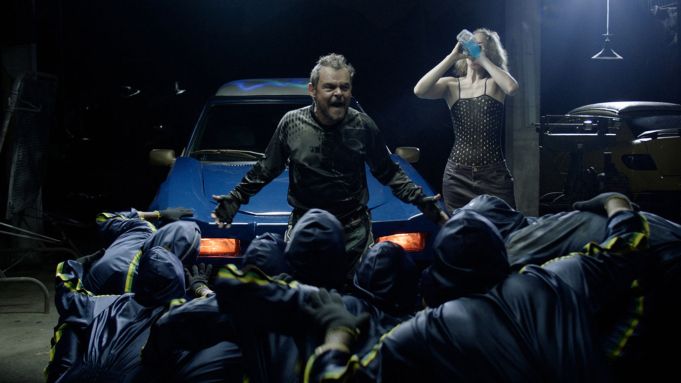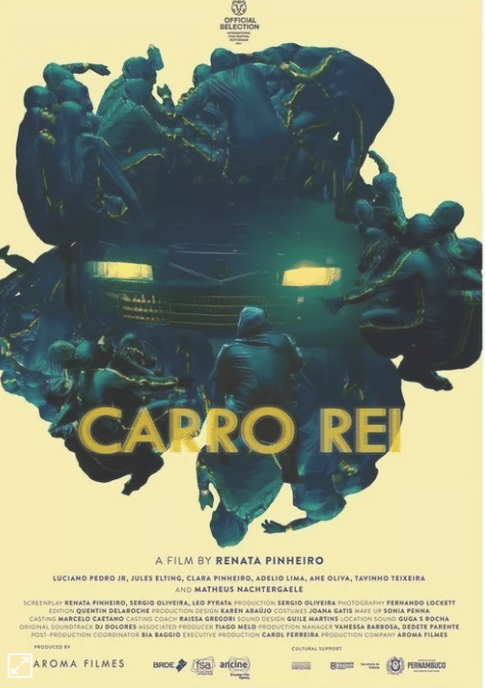
Balancing a dark sense of humour against several other themes and elements of genre, King Car offers an adventurous look at the relationship between man and machine. Sure, we’ve seen sentient vehicles before, but not quite like this. It’s a smart, if zany piece of work, busy, but (just about) giving us something which brings those ideas together.
We start with a glimpse of a Brazil which is rapidly modernising; the municipality of Caruaru is firstly shown with skyscrapers in the distance, but the remains of a rural, agricultural past still clinging on at the outskirts of its growing cities. Cows meander through scrap cars and drift onto the narrow roads, preventing a man from getting his wife, who is in labour, to hospital. In fact, she doesn’t get much further and gives birth in the back of the car. This seems to trigger some unusual ability in her son, Uno, who by the time he is a few years old seems able to communicate directly with cars. One in particular, part of his dad’s taxi fleet, even seems fond of him (though it’s not long before this ‘friendship’ seems suspect, and devastates the small family unit).
As Uno grows up, he seems to lose – or to forget – his abilities and he struggles to take his own path. Emphatically, he doesn’t want to spend his life simply doing what his father has done, and wants to train as a bio-agriculturalist, addressing issues like pollution and food production which have only worsened in the time it’s taken him to reach young adulthood. This causes a rift with his father, coincidentally dragging Uno back to the scrapyards and vehicles he’d left behind in his childhood. Finding his way back to the same, now wrecked cab from before, Uno realises he can still communicate with it. Thinking perhaps that his ‘gift’ can be turned to some purpose or perhaps out of pure curiosity at this stage, Uno enlists the help of his uncle Zé, and they renovate it (think Pimp My Ride meets Lawnmower Man). As it turns out, Uno and Zé have a particular set of skills with all cars, and it’s just in time: these old, fuel-guzzling cars made before a certain date have just been made illegal. It becomes a battle of Building Back Better against The Greater Good.

If the film has one flaw, then it’s in how it gives itself an awful lot to resolve. Its ideas on big topics like sentience, class and power lose some of their more thought-provoking, interesting elements as things settle into a more familiar-feeling good vs. bad narrative. King Car is at its best when it more tentatively explores some select ideas, and this it certainly does, whether or not this is a film which features talking cars as a central plot device. For example, it has a lot to offer on family dynamics, such as in Uno’s home, where tradition and respect bump up against his own plans and hopes but can’t push him entirely away from his father and uncle – for good or ill.
King Car also looks at the complexities of modernisation, which it does very well, examining the idea that ‘better’ is a debatable term and never means better for everyone; the drive to save the environment, for instance, is often decided by people who are negatively affected by it the least, and we get that here, more as a lesson than a lecture as Uno, his friends and family navigate their unprecedented situation. Well, Uncle Zé does a bit of lecturing on the sheer, endless possibilities for the relationship of mankind and technology, though he is represented to us as a rather wired, if largely well-meaning oddball who lives in a junkyard and moves around like Raoul Duke. That’s another thing we probably inevitably get here – comedy. Things shift from the sublime to the ridiculous as the film moves along, but jokes add some much-needed levity to a film which shifts from fantasy to coming-of-age drama right through to something which isn’t all that far from any number of ‘mad scientist’ stories, or ‘mad mechanic’, anyway. It’s a film which makes serious points, but it’s not po-faced.
Director Renata Pinheiro has used her art direction background alongside her previous directing experience to make a very beautiful, visually rich film here, with its fantasy-tinged Brazil looking genuinely superb on screen. All in all, King Car is an energetic, ambitious film which puts its own spin on the role of technology in people’s lives and has a great number of strengths.
King Car will screen at the 25th Fantasia International Film Festival. For more information, please click here.
